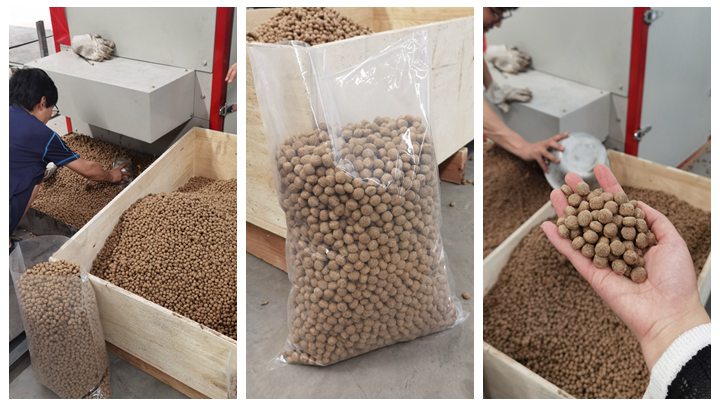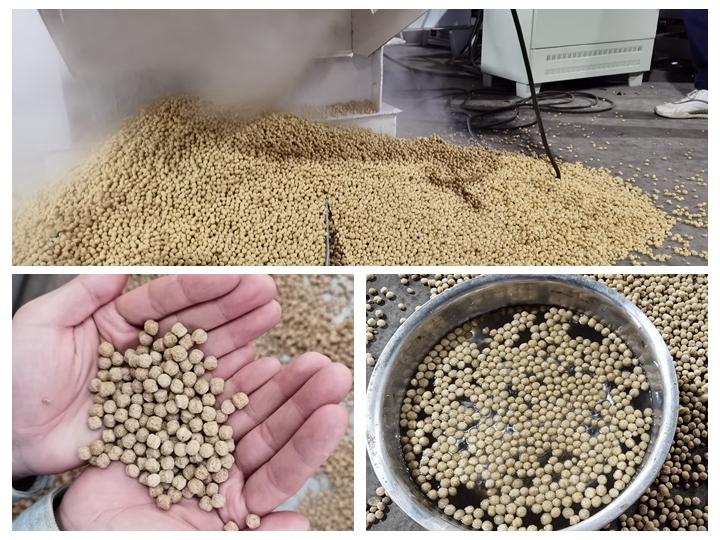This floating fish feed extruder machine is a single screw wet pellet machine needing steam for pellet production, suited for large plants. We offer another type for home and small farm use. Depending on your requirements, you can choose how many volumes of finished floating fish feed pellets to produce. Wet fish feed extruders produce premium aqua See full list on pelletizermill.com The cost of fish feed extruders can vary widely based on the aforementioned factors. Small-scale extruders might start around $2,000, while larger, more advanced machines can cost upwards of $50,000 or more. It’s crucial for buyers to assess their specific production needs against the features and capacities of available machines to find the most c... See full list on pelletizermill.com See full list on pelletizermill.com When raw material enters the feeder, it cooks and sterilizes under high pressure and temperature without external heating. Starch and fibers expand during curing. Under pressure-sealed conditions, a die shapes the material into pellets. The automatic machine’s screw rotation and front cutter then produce small, puffed balls at normal temperature an... See full list on pelletizermill.com The floating fish food extruder is widely used for aquatic feed, known for its versatility and low noise. The high temperature and pressure process kills salmonella and bacteria in the material, making particles easier to digest and absorb. We offer different molds for various feed pellet diameters (0.9-15mm) and shapes, meeting diverse needs. The ... See full list on pelletizermill.com Corn, corn, soybean, rice:contains about 10-14% protein, and also contains vitamins B1, B2, B6 and a small amount of enzymes. Straw powder, grass powder, rice bran, wheat bran: contain fiber, prevent various fish diseases Mustard Cake: Mix up to 40% cake in fish feed. But don’t use more than 20% dry cookies. Mustard cakes contain 30-32% protein. Co... See full list on pelletizermill.com ①Choose a plane position based on the production flow and workshop layout. For steel frame units, elevate the fish feed extruder. Position the cooler inlet 500~800mm below the extruder outlet, allowing room for a crusher if using high-starch mixtures. After discharge, material falls into the cooler via a hood or hopper, suiting various puffing proc... See full list on pelletizermill.com Oil change time 1) You must regularly replace the main bearing seat’s oil with new oil. Change the oil for the first time after about 2 months, then every other year. During oil changes, empty all old oil and clean the oil tank with compressed air. 2) For other bearing parts, grease once every 48 hours of operation. 3) Frequently lubricate the chain transmission mechanism on the conditioner. (for wet type fish feed extruder machines) 4) Regularly replace the oil in the conditioner’s reducer with new oil.The... Other maintenance precautions 1) Weekly, clean the feeding bin’s upper gate to avoid feed delays from blockages. 2) Remove residual material from the feeder barrel walls weekly. 3) Weekly, clean where the feeder outlet and conditioner inlet connect. 4) Clean the conditioner’s water and steam nozzles weekly for smooth liquid addition. 5) Weekly, clean the bypass and remove residual material at the extrusion assembly’s feed port. Electrical maintenance 1) Re-lock and check the primary wire in the main motor’s electronic control. (Note: After 15 days of commissioning, please re-lock the primary circuit in the electrical control cabinet) 2) Check for motor overload, thermal protection activation, main circuit short-circuit, air break protection activation, or motor damage during a sudden shutdown. See full list on pelletizermill.com

.jpg)
.jpg)
.jpg)

.jpg)
.jpg)
.jpg)
.jpg)
.jpg)
.jpg)
.jpg)
.jpg)
.jpg)

.jpg)